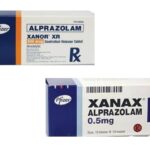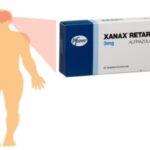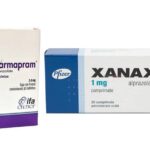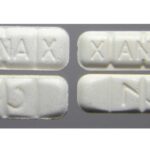Does Xanax Help With Opiate Withdrawal?

Xanax (Alprazolam) is a commonly prescribed psychotropic medication in the United States. Alprazolam is frequently prescribed to manage panic and anxiety disorders. Alprazolam belongs to a class of psychoactive medications called benzodiazepines.
Benzodiazepines bind to the GABA-A receptor. This receptor is made up of five subunits, e.g., alpha, beta, gamma, delta, epsilon, rho, etc. A common GABA-A receptor found in the CNS is made up of two alpha-1 subunits, two beta-2 subunits, and one gamma-2 subunit. The benzodiazepine binding site is between the alpha-1 and gamma-2 subunits.
Studies in mice suggest that the alpha-1 subunit mediates sedation, amnesia, and ataxic effects of benzodiazepines, and alpha-2 and alpha-3 subunits mediate anxiolytic and muscle-relaxing effects of benzodiazepines. Alprazolam treats anxiety and panic disorders by acting on the brain and nerves (central nervous system) to produce a calming effect. It works by enhancing the effects of a certain natural chemical in the body (GABA).
What are opiates?
Opiates include controlled prescription substances that are derived from Opium, which is a chemical that occurs naturally in poppy seeds and plants. These drugs are used clinically for treating mild to severe pain in patients. Due to their intensely calming effects, Opioids have tremendously high rates of abuse which, in many cases, can lead to addiction.
Opiates withdrawal is what happens when you stop taking opioid drugs after your body has come to rely on them to feel OK. It can affect you in many ways. Opiates attach to things called receptors on nerve cells in your brain, spinal cord, and other places to block pain messages that your body is sending to your brain. They also trigger your brain to release dopamine, a chemical that makes you feel good.
Opiate withdrawal is one of the longest studied and most well-described withdrawal syndromes. Opiate withdrawal has been described as akin to a moderate to severe flu-like illness. Opiate withdrawal is appropriately described as subjectively severe but objectively mild. Early symptoms typically begin in the first 24 hours after you stop using the drug, and they include:
• muscle aches
• restlessness
• anxiety
• lacrimation (eyes tearing up)
• runny nose
• excessive sweating
• inability to sleep
• yawning very often
Later symptoms, which can be more intense, begin after the first day or so. They include:
• diarrhea
• abdominal cramping
• goosebumps on the skin
• nausea and vomiting
• dilated pupils and possibly blurry vision
• rapid heartbeat
• high blood pressure
Although very unpleasant and painful, symptoms usually begin to improve within 72 hours, and within a week you should notice a significant decrease in the acute symptoms of opiate withdrawal.
Does Xanax Help With Opiate Withdrawal?
No, Xanax does NOT help with opiate withdrawal, as a matter of fact, doctors advise against the use of Xanax during opiate withdrawal because it could cause relapse and overdose. A study on the effect of alprazolam on opiate withdrawal suggests that Xanax suggests that alprazolam decreases the withdrawal syndrome in rats by dampening down the previously identified hyperactivity. However, no controlled studies have been conducted in humans to evaluate the findings of that research.





